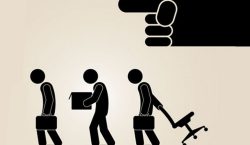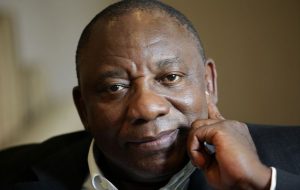

SOUTH Africa (SA) has unleashed its biggest once-off stimulus injection into the struggling economy in response to the Covid-19 pandemic that has led to a lockdown of the country until April 30.

Cyril Ramaphosa, President of South Africa.
President Cyril Ramaphosa’s plan to inject R500 billion into a social and economic support package is the country’s biggest one-time fiscal outlay and is almost 10 times the amount spent in preparation for hosting the Soccer World Cup 10 years ago.
“The impact of the coronavirus requires an extraordinary coronavirus budget — of around R500 billion — to direct resources towards fighting the pandemic,” he told the nation in a televised address on Tuesday.
The support package bolsters spending from a mere 0,1 percent of GDP to 10 percent of GDP.
The response to the pandemic, which has seen economists forecast a contraction as high as 10 percent in the economy, comes after engagements with several stakeholders over the past week — including Cabinet, the National Coronavirus Command Council, the President’s Coordinating Council, and the National Economic Development and Labour Council.
Even before the coronavirus pandemic hit South African shores, the economy was beset with headwinds, including a technical recession, credit ratings downgrade, load shedding, stubborn unemployment and lacklustre growth figures.
These grim economic realities have prompted calls from economists and business formations for government to reopen the economy to some degree, to prevent South Africa’s dire economic prospects from worsening.
Top of mind for government has been the urgent distribution of funding to those suffering a loss of income due to the lockdown, which was raised by labour federation the Congress of South African Trade Unions at a Nedlac meeting on Friday last week.
Before the lockdown was instituted, in order to slow down the rate of Covid-19 infection, Ramaphosa noted that it would have consequences for the SA economy especially the vulnerable and the poor.
Well targeted
Annabel Bishop, Investec chief economist said that the stimulus package appeared well-targeted, “but the details will reveal how effective it will be”.
Of the R500 billion, an amount of R130 billion would be reprioritised from the current budget. The remainder is to be sourced from international finance institutions and local sources like the Unemployment Insurance Fund, as well as international finance institutions such as the World Bank, International Monetary Fund.
Details weren’t announced as to when Finance minister, Tito Mboweni, will deliver the adjusted budget.
 Sifiso Skenjana, chief economist of IQ Business commented that government was working within its “confines” to address the consequences of the pandemic and its potential to exacerbate inequality.
Sifiso Skenjana, chief economist of IQ Business commented that government was working within its “confines” to address the consequences of the pandemic and its potential to exacerbate inequality.
The relief announced is a start to closing the “inequality gap” that may result because of the impact of the virus, he added.
While the health budget will be bolstered to fight Covid-19, Skenjana noted that the president had not addressed whether the health system would also be capacitated to treat other illnesses.
Raft of measures
Earlier this month, Ramaphosa announced a raft of measures as part of the first phase of responses to mitigate the impact of the Covid-19 crisis, including tax relief as well as R30 billion special National Disaster benefit Fund from the Unemployment Insurance Fund to be made available to retrenched workers.
A Solidarity Fund was also established to raise financial assistance to support the vulnerable, which has since received donations from the Motsepe Foundation and its associated companies as well as the Oppenheimers and other companies, such as Naspers.
Ramaphosa said government would be taking a “risk adjusted approach” when it came to the re-opening of the economy in the midst of the coronavirus pandemic.
“If we end the lockdown too soon or too abruptly, we risk a massive and uncontrollable resurgence of the disease.
“We will therefore follow a phased approach to gradually lift the limits on economic activity,” Ramaphosa said, adding that Mboweni would unpack provisions and guidelines for re-opening the economy as the days go by.
The president appeared to be “considering a “very, very slow” process of starting to open up the economy,” Hugo Pienaar, chief economist of the Bureau of Economic Research said, adding that the support package was probably more than what most people expected.
Several other economists agreed that Ramaphosa’s measures showed he was aware of Covid-19’s social and economic ramifications for South Africa.
Francois Stofberg, Efficient Group economist called Ramaphosa’s address “positive”, saying government had demonstrated its understanding of a long-term emerging trend of governments pooling resources to protect workers using borrowed funds and transfers.
Sifiso Ntombela, an economist from the National Agriculture Marketing Council, , praised Ramaphosa’s commitment to protecting the most vulnerable South Africans.
He said he looked forward to seeing how Mboweni would implement’s the said “risk-adjusted approach”.
Busisiwe Mavuso, Business Leadership South Africa chief executive added that it was “central” that government was “clearly trying to ensure that there is money in the hands of South Africans”.
“The president knows those growth figures and unemployment projections that are coming. He also knows that without disposable income, you can’t kickstart the economy,” said Mavuso. — Fin24